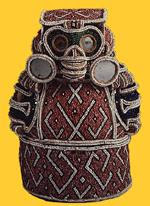Who really sailed the ocean blue in 1492? Spanish scholars are on a mission to demystify Christopher Columbus's life, long shrouded in a veil of mythic heroism.
By Lisa Abend and Geoff Pingree
Correspondents of The Christian Science Monitor
MADRID
Genovese nobleman or Catalan pirate? Adventurous explorer or greedy tyrant? What if the Italian gentleman who discovered America was in fact a brutal torturer and slave owner? And what if he wasn't even Italian?
Schoolchildren may learn about a daring hero who proved the Earth wasn't flat, but because his biography is pocked with holes, Christopher Columbus is a figure around whom elaborate theories and enigmatic rumors have long circulated. This year, the 500th anniversary of his death, two Spanish scholars are working to clear up some of the mysteries.
José Antonio Lorente, a geneticist at the University of Granada, is attempting to resolve one of the greatest enigmas - the question of Columbus's origins. In 1927, Peruvian historian Luis Ulloa Cisneros claimed Columbus was from Catalonia - in what is today northwestern Spain - rather than from the Italian port city of Genoa.
Since then, theories have proliferated, some suggesting that Columbus was a Catalan nobleman who rebelled against King Ferdinand's father, King John II, by engaging in piracy on behalf of the French, and then hid his origins to win favor with the son. Others maintain that he was the illegitimate child of Prince Carlos de Viana, a Majorcan nobleman related to Ferdinand and Isabella. Still others suggest that Columbus was a Jew, whose family fled to Genoa to escape persecution.
A historian at the University of Seville asked Mr. Lorente (who had previously used genetic testing to determine that bones in the Cathedral of Seville belonged to Columbus's own illegitimate son), to help resolve the Catalan/Genovese issue.
Collecting saliva samples from hundreds of people in Catalonia, the Balearic Islands, Genoa, Valencia, and the south of France with the last name of Colón, Colom, or Columbo, Lorente is comparing their DNA with that taken from the bones of Columbus, his brother, and Prince Carlos de Viana. "This way, we can try to determine which population with the same last name as Columbus has the most genetic similarities and differences to him," says Lorente.
The study, results of which were supposed to be released last week to coincide with the Spanish celebration of Columbus Day, has been delayed due to the technological difficulties. "Right now, we haven't developed sufficient markers that can be applied to DNA that comes from bones," says Lorente. "We're working on improving it every day, but we can't say when we'll have results."
Until he finds conclusive answers, the geneticist finds the Catalan theory compelling. "Although the majority think he was Italian," Lorente comments, "there are certain aspects of his biography that suggest non-Italian origins."
But while Columbus's origins remain undetermined, Consuelo Varela, a historian at Spain's Consejo Superior de Investigaciones Cientificas, has answered another question: Why, once he was governor of Hispaniola, did Columbus fall so far from favor that Ferdinand and Isabella ordered him arrested and returned in chains to Spain?
After archivist Isabel Aguirre discovered an uncatalogued transcript of Columbus's trial and brought it to Ms. Varela's attention, the answer was clear to her: Even by the uncharitable standards of 16th-century Spanish colonies, Columbus was a brute.
In her book "The Fall of Columbus," Varela uses the testimony from 23 witnesses contained in the document to show that as governor of Hispaniola, Columbus regularly used torture to maintain order on the island. "It was far more brutal than we had known," says Varela. "It was a frontier society, with terrible misery and injustice."
Columbus was also a strong supporter of slavery, refusing to baptize the indigenous people of Hispaniola so that he could enslave them (Spanish law prohibited the enslavement of Christians), and auctioning Spaniards into slavery, including a young boy caught stealing, as punishment. Varela also notes that Columbus was "surprisingly greedy. He was always tremendously worried about making money."
Although academic specialists have largely hailed Varela's work, popular readers have been less welcoming. An Italian author of historical novels recently wrote her to complain about the unflattering portrait and accused her of falsifying the document. Varela understands the resistance. "No one likes to see the dark side of a mythic person," she says.
For both scholars, it is the mythic elements of Columbus's personality and history that explains public fascination with him. "Columbus is a universal figure," says Lorente. "When you add in the fact that he never said anything about his origins, you have the perfect mystery."
Full HTML version of this story which may include photos, graphics, and related links
By Lisa Abend and Geoff Pingree
Correspondents of The Christian Science Monitor
MADRID
Genovese nobleman or Catalan pirate? Adventurous explorer or greedy tyrant? What if the Italian gentleman who discovered America was in fact a brutal torturer and slave owner? And what if he wasn't even Italian?
Schoolchildren may learn about a daring hero who proved the Earth wasn't flat, but because his biography is pocked with holes, Christopher Columbus is a figure around whom elaborate theories and enigmatic rumors have long circulated. This year, the 500th anniversary of his death, two Spanish scholars are working to clear up some of the mysteries.
José Antonio Lorente, a geneticist at the University of Granada, is attempting to resolve one of the greatest enigmas - the question of Columbus's origins. In 1927, Peruvian historian Luis Ulloa Cisneros claimed Columbus was from Catalonia - in what is today northwestern Spain - rather than from the Italian port city of Genoa.
Since then, theories have proliferated, some suggesting that Columbus was a Catalan nobleman who rebelled against King Ferdinand's father, King John II, by engaging in piracy on behalf of the French, and then hid his origins to win favor with the son. Others maintain that he was the illegitimate child of Prince Carlos de Viana, a Majorcan nobleman related to Ferdinand and Isabella. Still others suggest that Columbus was a Jew, whose family fled to Genoa to escape persecution.
A historian at the University of Seville asked Mr. Lorente (who had previously used genetic testing to determine that bones in the Cathedral of Seville belonged to Columbus's own illegitimate son), to help resolve the Catalan/Genovese issue.
Collecting saliva samples from hundreds of people in Catalonia, the Balearic Islands, Genoa, Valencia, and the south of France with the last name of Colón, Colom, or Columbo, Lorente is comparing their DNA with that taken from the bones of Columbus, his brother, and Prince Carlos de Viana. "This way, we can try to determine which population with the same last name as Columbus has the most genetic similarities and differences to him," says Lorente.
The study, results of which were supposed to be released last week to coincide with the Spanish celebration of Columbus Day, has been delayed due to the technological difficulties. "Right now, we haven't developed sufficient markers that can be applied to DNA that comes from bones," says Lorente. "We're working on improving it every day, but we can't say when we'll have results."
Until he finds conclusive answers, the geneticist finds the Catalan theory compelling. "Although the majority think he was Italian," Lorente comments, "there are certain aspects of his biography that suggest non-Italian origins."
But while Columbus's origins remain undetermined, Consuelo Varela, a historian at Spain's Consejo Superior de Investigaciones Cientificas, has answered another question: Why, once he was governor of Hispaniola, did Columbus fall so far from favor that Ferdinand and Isabella ordered him arrested and returned in chains to Spain?
After archivist Isabel Aguirre discovered an uncatalogued transcript of Columbus's trial and brought it to Ms. Varela's attention, the answer was clear to her: Even by the uncharitable standards of 16th-century Spanish colonies, Columbus was a brute.
In her book "The Fall of Columbus," Varela uses the testimony from 23 witnesses contained in the document to show that as governor of Hispaniola, Columbus regularly used torture to maintain order on the island. "It was far more brutal than we had known," says Varela. "It was a frontier society, with terrible misery and injustice."
Columbus was also a strong supporter of slavery, refusing to baptize the indigenous people of Hispaniola so that he could enslave them (Spanish law prohibited the enslavement of Christians), and auctioning Spaniards into slavery, including a young boy caught stealing, as punishment. Varela also notes that Columbus was "surprisingly greedy. He was always tremendously worried about making money."
Although academic specialists have largely hailed Varela's work, popular readers have been less welcoming. An Italian author of historical novels recently wrote her to complain about the unflattering portrait and accused her of falsifying the document. Varela understands the resistance. "No one likes to see the dark side of a mythic person," she says.
For both scholars, it is the mythic elements of Columbus's personality and history that explains public fascination with him. "Columbus is a universal figure," says Lorente. "When you add in the fact that he never said anything about his origins, you have the perfect mystery."
Full HTML version of this story which may include photos, graphics, and related links










No comments:
Post a Comment